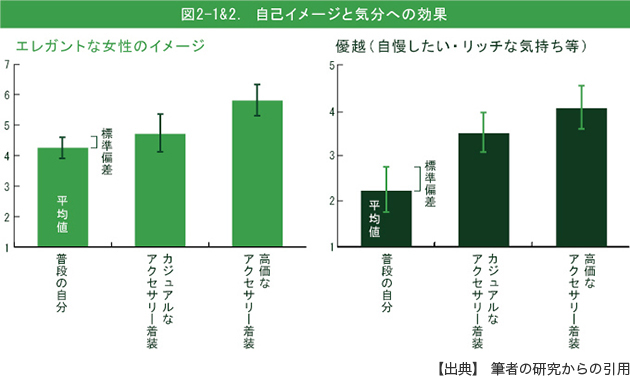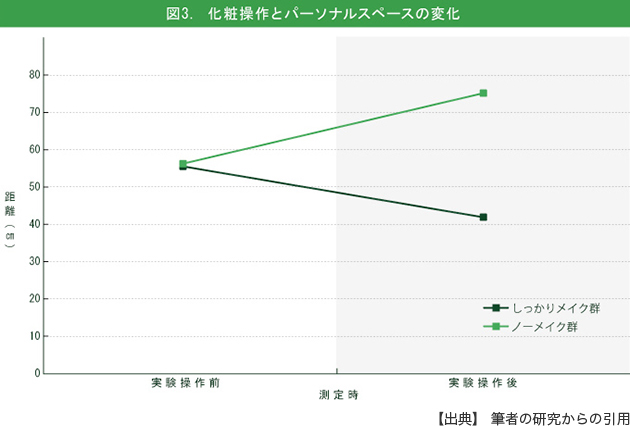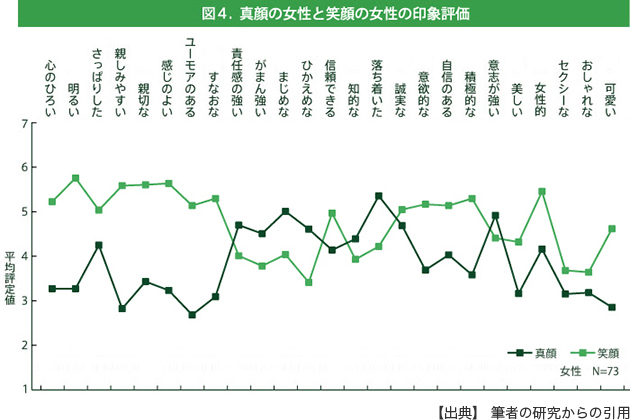私たちが生きている世界には、
身近なことから人類全体に関わることまで、
さまざまな問題が溢れています。
意外に知られていない現状や真相を、
本学が誇る教員たちが興味深い視点から
解き明かします。
「人は見た目がすべて」と言われると、反発したくなってしまいますが、他人は私たちの内面を“推測する”ことしかできません。実像を知ることは決してできないので、他人がどんな人なのかを知る術といえば、まず“外見から”ということになります。ですから、自分が相手の目にどう映るかは非常に大切なことです。“第一印象が大切”と言われますが、とりわけ初対面での見た目は今後の人間関係に大きく影響を及ぼします。他人は自分が感じた印象に基づいて、私たちへの接し方を決めるものなのです。
例えば、海外の研究者による実験ですが、レストランで女性ホールスタッフが髪に花を飾った場合、飾らなかったときに比べて、チップの額が平均0.26ドル増えたという結果が報告されています。また女子大学生が見知らぬ人に10セント硬貨を借りようとして、ある条件ではスカートとストッキングを身につけたきちんとした身なりで、別の条件ではジーンズをだらしなくはいて実験を行った結果、きちんとした服装のときは81%の人が10セントをくれたのに対し、だらしない服装の場合は32%と、大きな差が出ました。
服装によって、人の印象は大きく変わります。その扱いは圧倒的に違うものです。上記の実験でわかるように、日本より外国で顕著に見受けられるものですが、見た目がきちんとしていれば他人から助けてもらえる、そうでないと助けてもらえないとはっきり差が出てしまうくらい、外見というのは人を判断するうえで重要な要素になります。
人は本人が意図する、していないに関わらず、服装や化粧、話し方、姿勢、表情など、外見から勝手に情報を読み取ってしまうものです。そこに気づき、自分の外見をコントロールすることができれば、コミュニケーション能力は飛躍的にアップするでしょう。
あなたは「おしゃれなんてくだらない、自分は中身で勝負だ」と思っていませんか?でも人は私たちの服装を見て、気分を良くしたり悪くしたりすることが、ままあるものだということにお気づきでしょうか。服装は自分の個性を表す手段であるものの、相手に対する敬意や配慮の表れでもあるのです。
もしも葬儀のときに、礼儀にかなっていない服装をしたら、どういう反応が返ってくるでしょうか?想像できますね。ではデートのときはどうでしょう。相手があまりかまわない服装をしていると、ガッカリしたりしませんか?服装にかまっていないということは、それを見る相手がどう思おうと、一向にかまわないということの表明です。「どう思われてもいい」ということは、相手に好意や敬意を抱いていないということを、服装で表現しているようなものです。それでは相手が不快に思ってしまっても仕方ないですね。
「装う」ことの中には、女性であれば化粧も含まれます。ここに化粧に関して、他人の目から見た評価を表した図があります。他者から見ると、まったく化粧をしていないというのは、あまり好意的に受け取られないようです。ナチュラルメイクが最も好意的に受けとられ、化粧が濃くなっていくと、また否定的になってしまいます。化粧をする側からすれば、化粧をしていないのと、ナチュラルメイクの間で、そんなに大きな差があるようには思わないかもしれませんが、受け手にとってはやはり服装と同様に、配慮のある、なしを自然に感じとってしまうのです。濃い化粧の場合は、TPOが関係してくることも多いでしょう。

社会生活でも同様です。自分が着たい服装をすることは、精神衛生上大切ですが、あまりにも個性的すぎたり、TPOに合わない場合は、取引先や上司、同僚などへの配慮が足りないということにつながりかねません。きちんとした服装やメイクをするということは「私はあなたに対して敬意をはらっていますよ」というメッセージを発信することでもあるのです。相手との良好な関係を築きたいと思うのであれば、外見に気を配ることは必要条件であると言えるでしょう。
ファッションは、自分を好意的に受けとめてもらうための一助となるだけでなく、自分の心持ちに対しても効果があるものです。「今日は気合を入れていきたい」「今日は穏やかに1日を送りたい」など、自分の気持ちをコントロールするために服装やアクセサリーを選んだり、ときには相手から見えない下着に凝ったりすることもあります。
青学生を対象に、こんなフィールドワークをしてみました。女子学生がアクセサリーを身につける場合、通常はひとつ2,000~4,000円代の価格帯でまかない、数多く持つことで服装に合わせてアクセサリーを替えることが多いようです。その女子学生たちに、価格が7万円であることを告げてネックレスを貸し出しました。すると身につけたときの気持ちが、いつもと変わっていることが分かります。「胸をはれる」「自信がもてる」など、自分の気持ちが高揚して前向きな気持ちになったり、自分のイメージを高めることができるようです。

化粧もアクセサリーと同様の効果があることが実験でわかっています。化粧をしている自分が“公の自分”という認識でいる人は、化粧をとってしまったスッピンの状態は裸も同然で、自分が損なわれていると感じてしまうほどなので、他人との心理的な距離がグンと離れてしまいます。普段化粧をしている人ほど「化粧をしているときは、人に対して積極的になれる」と答えている研究結果もあり、女性が効果を自覚して化粧していることがわかります。ファッションには「自分をカスタマイズ」し、「なりたい自分に近づく」といった効果があり、それを自覚的に取り入れることが可能なのです。

「ファッションよりも中身」と、ファッションを軽視してしまう人は、このようなファッションの効果を知らないし、知ろうともしていないと言えます。「自分は中身で勝負しているんだ」と言っていながら、その実、ただの食わず嫌いを自覚していなかったり、許容範囲が狭かったり……自分が思うより自分の内面が浅いことを露呈させてしまっているのです。「みんなが同じファッションをしていて個性が感じられない」と言う人も同様です。それぞれのちょっとしたファッションの工夫を見落としている可能性があります。ファッションに理解があるということは、より深く自分や相手を理解していることの表れであることも多いのです。
私たちは言葉だけでなく、言葉以外からも相手を判断します。それが「非言語コミュニケーション」です。身振り、手振り、姿勢、動作などがありますが、表情も非言語コミュニケーションのひとつです。例えば最初に例にあげた、レストランでのチップの額の違いは、ファッションだけでなく、表情も関係しています。仏頂面ではなく、笑顔で接客するとやはりチップは多くなります。
就職の面接でも笑顔はとても大切です。面接のHow to本などには「面接官とアイコンタクトをすると良い」と書かれていたりしますが、アイコンタクトだけでは相手に緊張感を与えかねません。アイコンタクトに加えて、ときどき笑顔を浮かべることができれば、相手に良い印象を与えることができます。笑顔は、好意の表明です。人は一方が笑顔を向けると、それに対して笑顔で返そうとする傾向があり、これを「返報性」と言います。面接時に適切な笑顔のやり取りができれば、好印象になることはまず間違いありません。また笑顔は、余裕の表れでもあります。仕事のときに笑顔で受け応えすると「この人は有能だ」と相手に感じてもらうことができます。

また笑顔に次いでコミュニケーションで大切なのは、謝罪の表情です。文句を言われたことに対して不満の表情を浮かべている限り、怒っている相手から許されることは決してありません。仕事上では、謝罪の重みが異なるので「謝罪の際には上司を連れていく」ことがよくありますし、それが上司の仕事でもあったりしますが、そのように礼を尽くして謝罪したとしても、当事者が不満の表情を浮かべていては、相手の怒りを増幅させてしまいます。
いかに笑顔と謝罪の表情をどれだけ自在につくることができるか。まずこの2つの表情をコントロールすることができれば、コミュニケーションの基本である自己表現と対人関係の調整が可能です。表情は表情筋によってつくられますから、鏡を見ながら表情筋を鍛えるなど、訓練の仕方はいろいろあるので、試してみてはいかがでしょうか。
コミュニケーションは、いわば“こころ”のキャッチボールです。相手が受け取りやすいところにボールを投げる、受け取る側も投げられたボールを少しぐらいコースが逸れていても精一杯手を伸ばして取ろうとする、そうすればやり取りを長く続けることができます。キャッチボールが長く続けば、どんどん楽しくなっていきますね。見た目は私たちの“こころ”をのせたボールなのです。相手を思いやって外見を整える、受け取る方も相手を慮ってみる、そうしてやり取りを続けるための努力を双方が惜しみなくすれば、コミュニケーションの内容も深まっていき、どんどん面白くなっていくものだと思います。
(2015年掲載)